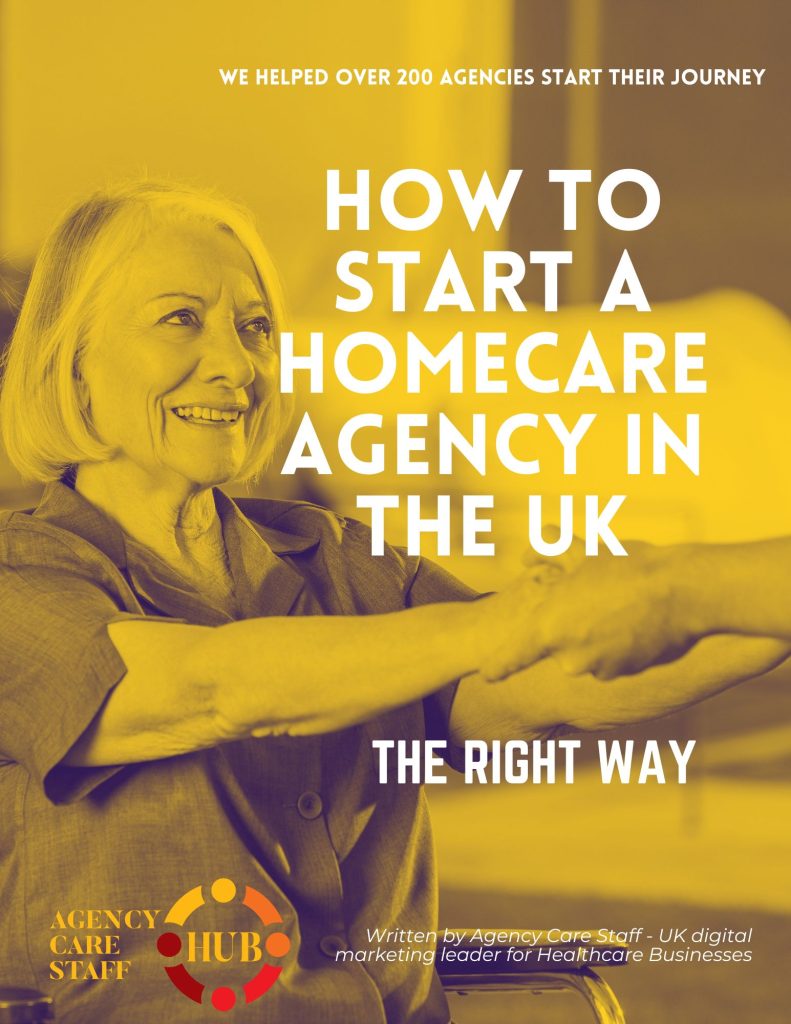How to start a care agency in the UK?
How to start a care agency in the UK?
Reading this article, you will find out about:
- what do you need to start a Domiciliary Care Agency
- things you have to consider
- policies and procedures
- structure of your business
- tips on how to be successful
- our Starter Pack
First, let’s clarify what a “care agency” is. We noticed that this is a term that people use for a Domiciliary Care Service. Domiciliary Care Agencies are also known as Homecare Agencies. Domiciliary Care Agencies offer care to people in their own home.
This article is full of resources so please read till the end. It will give you a good understanding on how to start a Domiciliary Care company. Once you finished reading this blog, and you want more questions answered, please contact us: contact@agencycarestaff.co.uk
What experience or qualification do I need?
If you want to start a Domiciliary Care or Homecare Service (depending on what you want to call it) it is mandatory to have experience in care and suitable management qualifications to be able to start this type of business. This is because you will be solely responsible for the care provided and the welfare of your clients. You need to register your business with the CQC (Care Quality Commission). The CQC registered manager can be the owner, or the owner can employ/appoint a qualified person (a Registered Nurse, a Social Worker, or a care assistant with an NVQ Level 5 Qualification in Health and Social Care).
Apart from the care side you will need to have a basic understanding of:
– how to run a business
– marketing
– recruitment
– using technology (this is quite important as everything has shifted towards technology these days)
– payroll
– HR and UK employment legislation
The above are our recommendations only. If you have the experience or qualifications mentioned above, it will make things a lot easier for you. Read the full article to understand why.
How to register with CQC?

Domiciliary Care Providers must register with the CQC. You can access below the CQC guidelines on how to register.
I will direct you to two useful CQC pages:
- New provider application
- What is registration? An in-depth guideline
CQC has 14 regulated activities. For a more detailed explanation of who is covered by the registration system and a description of each regulated activity, you should refer to the Scope of Registration document.
The scope of registration form link (a very in dept form that explains who needs to register)
Choosing my business address
“Can I use my home address?”. Yes. You can. However you need to consider the following:
- the room must be converted into an office
- no other things should be stored in that room
- it must be lockable – no access to children or unauthorised people
- it must contain lockable metal filing cabinets and the devices must be password protected
- think about access to parking, toilets, drinks
Virtual address/office
You can rent an office. However, please consider the following:
- you rent an actual office that only you have access to; CQC does not accept shared spaces/offices
- ask the office owners if you can use the address on Google Maps
- you can’t just use a virtual address without actually renting an office space.
Appointing a registered manager
When appointing a manager for a domiciliary care business, it’s essential to ensure that the individual meets the Care Quality Commission’s (CQC) requirements for a registered manager under Regulation 7 of the Health and Social Care Act 2008. The Director of the company can apply to be both the Registered Manager and the Nominated Individual. A registered manager must be of good character, possess the necessary qualifications, competence, skills, and experience to manage the regulated activity effectively.
Qualifications required
The newly registered manager must meet at least one of the criteria’s below:
- To be a doctor in the UK
- To be a registered general nurse in the UK
- Poses an NVQ Level 5 Certificate in Health and Social Care Management
Choosing the services you will offer
For the registration purposes and for the initial stage of your business, we recommend keeping things simple. We recommend that you register for:
- Personal Care
- Adults over 18 and 65
- Physical and Sensory impairments
This tactic will keep the CQC application and interview as simple as possible. If you add “Learning difficulties and Autism” this can complicate things.
After you receive your CQC license you can always add new services to your registration.
Another reason for keeping the service users’ band simple is that you will have the chance to learn and slowly grow your business.
How to find your clients
Decide how you want to secure business for your home care agency. Will you provide your services to self-funding clients? Or will you enter local authority tenders to build your business? You might wish to do both. Again, your research can help you determine your choice.
For self-funded clients we recommend our clients to use paid ads (Google and Meta), flyer distribution, and radio adverts.
To access clients funded by the local council we can help you with the tendering process.
Start-up costs to consider
It’s essential to budget for a variety of start-up costs to ensure the business operates smoothly and complies with regulations. Key expenses include:
- CQC Registration Fees:
- Fees associated with registering as a care provider and appointing a registered manager.
- Premises and Equipment:
- Setting up an office space, including furniture, computers, phones, and other office supplies.
- Equipment for staff, such as mobile devices for care management software or protective clothing.
- Staffing Costs:
- Recruitment costs, including advertising, interviews, and onboarding.
- Initial salaries for care workers and administrative staff.
- Training costs to ensure staff meet CQC standards, including safeguarding, manual handling, and first aid.
- Insurance:
- Essential cover such as public liability, employer’s liability, and professional indemnity insurance.
- Technology and Software:
- Care management systems for scheduling, record-keeping, and compliance tracking.
- Payroll and accounting software.
- Marketing and Branding:
- Designing a logo, building a website, and creating printed materials like business cards and flyers.
- Advertising to attract both clients and staff.
- Legal and Consultancy Fees:
- Costs for legal advice to establish the business and draft service contracts.
- Policies and Procedures
- Consultancy fees for help with meeting CQC requirements and preparing for inspections.
- Vehicle Expenses (if applicable):
- If staff require transport, costs for purchasing, leasing, or maintaining vehicles, as well as fuel.
- Miscellaneous Compliance Costs:
- DBS checks for staff and managers.
- ICO Registration
- First aid kits and other necessary supplies to meet health and safety requirements.
Planning for these expenses ensures a solid foundation for delivering quality care and achieving compliance with CQC standards.
What other things do I need to consider?
A Domiciliary Care Service can be extremely rewarding if done properly but also, no doubt, incredibly challenging.
Cash flow
You need to consider cash flow. How will you manage your money? Your income?
How will you pay your employees? Do you have all the processes in place to manage that?
Consider that as a Domiciliary Care you will usually be paid monthly by private clients, and sometimes after 60 days by the local council. To maintain some cash flow look it is ideal to have a lot of private clients.
It means you need to have quite a substantial amount of money when you start a care agency, to be on the safe side. The staff must be paid, and it is usually on a weekly basis!
Training
Running this type of business means that from a training point of view there are no if’s or but’s. All your staff must complete their mandatory training. And you need to evidence that during CQC inspections.
You can use ACSTRA Training to offer all the online mandatory training your staff needs.
DBS checks
Part of your duties will be DBS checks. This is a legal requirement for all staff. You can use companies like uCheck to check the DBS of new or existing employeess. Existing employees must renew their DBS every 3 years.
Interviews

The way you interview your staff will affect the future of your agency. If you recruit, and retain competent staff, your business has more chances of being a successful one. If you start to compromise on the quality of your staff, then the image of your care agency will suffer. It will be difficult for you to find contracts as care settings will refuse to work with you. When recruiting you need to be sure the person is qualified for the job. Ask for evidence of their qualification, if necessary, ask for references from previous jobs. If they don’t have experience, it’s fine, but make sure you offer all the training they need.
I advise that you have formal interviews with candidates. Document everything discussed during the interview, especially the terms agreed. Keep the interview notes archived, including the ones you have declined! On many occasions applicants claimed that they have been discriminated against during the interview (for several reasons). You need to be able to clearly show evidence that you declined a staff member due to the lack of skills and knowledge.
If you interview nurses for a Registered Nurse position, I advise that the person that interviews the nurse has solid knowledge about NMC guidelines.
Documents
– Business plan
– Policies and Procedures (buy here)
– ICO Registration Certificate
– Business Insurance Quote
– Financial Viability Form
– DBS for the Registered Manager and Nominated Individual
– Job Application form
– Contract with the staff
– Staff Handbook
– Contract with the clients
– Interview questionnaire
– Price list
– Reference request form
– Staff Profile
– Statement of purpose (Domiciliary Care)
– Appraisal and supervision forms
– Time sheet
Domiciliary Care Providers can use QR code check-in and check-out systems for their staff when visiting a client in their own home.
Don’t forget that these are the ones that you will use the most but there are other documents that you will need. You can fin them here: Operational Documents.
Policies and procedures
Something we strongly advise for a Domiciliary Care Service to have.
See our Policies and Procedures.
How would you deal with complaints? Because I can assure you that they will come, no matter how good you are. We are humans and we make mistakes. In the healthcare industry we are held accountable for those mistakes. As a manager of the agency, you will need to have clear details on how you deal with complaints.
How do you address concerns with your staff? Do you have a “Concerns meeting form” in place? Do you have written evidence that you addressed the concerns raised by the people you supply staff for? In some instances, you will be required to provide that evidence. Example of complaints: medication errors, uniform policy, long nails, make-up, hair not tied up, jewelry, punctuality, professionalism/care ethic etc.
We covered a few things you need to consider having in place to run a care agency. Now we will move on to talk about the structure of your business.
Franchise, limited company (Ltd) or business partnership?
You have a variety of options on how to structure your new care agency. Which is good. Below you will find some information about franchises, business partnership, or limited companies, but you will have to decide which one is more suitable for you. In most cases people go for a Private Limited Company – Limited by Shares (the classic LTD).
What is a franchise?
Franchising is a method of expanding a business. Some well-established care agencies can offer you a license which allows you to use their brand, resources, and systems. Less hassle for you as they offer you a boost starting up the agency. They offer advice, branding materials, marketing support (you can advertise your agency for free on our website), payroll systems etc. You can get contracts more easily if you are part of a well-known, national care agency franchise. The downside is that you must operate following their rules, buy the franchise which is anything between £30k to £70k and you must pay them a percentage of your earnings. Also despite the selling point, the support is not always there.
Private Limited Company
The most popular option. All money is yours after you paid the taxes. You are the director of the company.
Click the link below to find out more about how to set up a limited company:
https://www.gov.uk/limited-company-formation
Business partnership
The earnings are split between the partners. Click the link below to find out more about business partnership
https://www.gov.uk/set-up-business-partnership
Choose wisely as the future of your business depends on the initial decisions. Try not to take risks. Grow your business slowly by taking small steps at the time. For example, do not rent a big office unless you are sure you have the money to cover the expenses.
Public liability insurance
It is something you MUST purchase. There are a lot of insurance companies out there that offer this type of service for you. Just type in Google “public liability insurance for care agencies”. Find out what it is and how much it costs. Alternatively you can contact us directly as we can recommend to you a few insurance companies our previous clients worked with. This will protect your wallet in case of any accidents/incidents, deaths, or serious complaints. You must know very well that accidents happen in the care industry and sometimes they are profoundly serious. What I suggest is that you purchase it once you have a contract. Otherwise, you will pay monthly fees even if your business is not making any money.
Feedback
After you start the business, it is good practice to ask for feedback from your clients. It is also a CQC requirement. Take everything on board and think about how you can improve. Demonstrate your improvement by going back to your clients and talk about what changes you implemented to improve your service.
Do spot-checks. The clients will appreciate that, it shows that you are interested in providing a good service. Look at the uniform policy, attitude and get feedback on punctuality and professionalism. Follow up with any negative feedback.
Leadership skills

Fees and pay rate
We can help you find out what to charge your clients. This is included in our Starter Pack. Essentially, we research what other agencies charge for private clients in a specific area. If you work with the local council, they wil dictate the fees.
Choose the rates you charge wisely as this can be the downfall of your business. Consider the quality of the service you can offer. Sometimes the clients prefer to pay more in return for a good service.
We offer a starter pack for those interested in starting a Nursing/Recruitment Agency or a Domiciliary Care Agency. The pack includes everything you need to run your business, even from home.
Click here or tap on the image to see our Starter Pack.
I hope this article helps. As I said, having a care agency is challenging but rewarding at the same time.
Please comment below if you want me to add anything else. You can also contact me using the Contact form on our website.
Whatever you do, do not compromise on the standards of care! Always put the safety of vulnerable people first! Thank you.
If you are looking to start any other type of business, please visit Massive Startup
They offer comprehensive Business Starter Packs to help you start your business the right way and be ahead of your competition.







